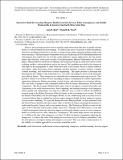Interactive Model for Assessing Mangrove Health, Ecosystem Services, Policy Consequences, and Satellite Design in Rio de Janeiro Using Earth Observation Data
Author(s)
Reida, Jack B.; Wood, Danielle
DownloadIAC_2020_Paper.pdf (3.694Mb)
Open Access Policy
Open Access Policy
Creative Commons Attribution-Noncommercial-Share Alike
Terms of use
Metadata
Show full item recordAbstract
There is an increasing need for tools to translate Earth Observation (EO) data into societally rele-
vant metrics to inform human decision-making. To address this need, we present a multi-disciplinary,
interactive modeling framework to advance ecological forecasting and policymaking using EO data. This
framework will integrate four model components into one tool: Earth Science, Social Impact, Human
Behavior and Satellite Design. The capabilities provided by this framework will improve the management
of EO and socioeconomic data in a format usable by non-experts, while harnessing cloud computing,
machine learning, economic analysis, complex systems modeling, and model-based systems engineering.
This paper presents a prototype that demonstrates the viability of the framework via a case study:
the mangrove forests in the Guaratiba area of Rio de Janeiro. These mangroves are vulnerable due to
urbanization and rising sea levels. They provide a variety of ecosystem services, including serving as
a mechanism for carbon sequestration, supporting subsistence shing, preventing coastal erosion, and
attracting an ecotourism industry.
The case study of mangrove and community health in Rio de Janeiro demonstrates all four model
components. The Earth Science Model builds upon work by NASA biospheric scientists to use EO data,
cloud computing and machine learning to track mangrove extent, health, and vulnerability over time for a
600 km2 area, as well as work by the Espa co research group at the Universidade Federal do Rio de Janeiro
on the local mangrove ecosystem. To create the Human Decision Making model, we have partnered with
Instituto Pereira Passos (the data science o ce of the Rio de Janeiro municipal government) to understand
the policy history and socioeconomic factors. To build the Social Impact model, we are collaborating with
ecosystem services economists to explain how policies impact mangrove health and how mangroves impact
socioeconomic wellbeing. The Satellite Design Model accounts for the types of data collection used by
policy makers since 1985.
Through such collaborations, we are able to build an integrated, interactive model that policymakers
can use to assess mangrove health, ecosystem services value, and policy consequences. The model helps
answer such questions as: (a) What is the state of the mangroves over time? (b) How are human
communities impacting the mangroves? (c) what is the value of the mangrove ecosystem services to
human communities? and (d) what policies can improve human and mangrove outcomes? This case
study is demonstrative of the viability of a similar approach for ecosystems around the world.
Date issued
2020-10Department
Program in Media Arts and Sciences (Massachusetts Institute of Technology)Journal
71st International Astronautical Congress (IAC): Cyberspace Edition
Publisher
International Astronautical Federation
Citation
Reida, Jack B. and Danielle R. Wood."Interactive Model for Assessing Mangrove Health, Ecosystem Services, Policy Consequences, and Satellite Design in Rio de Janeiro Using Earth Observation Data." 71st International Astronautical Congress (IAC): Cyberspace Edition, October 2020, International Astronautical Federation, 2020. © 2020 Jack Reid and Danielle Wood
Version: Author's final manuscript